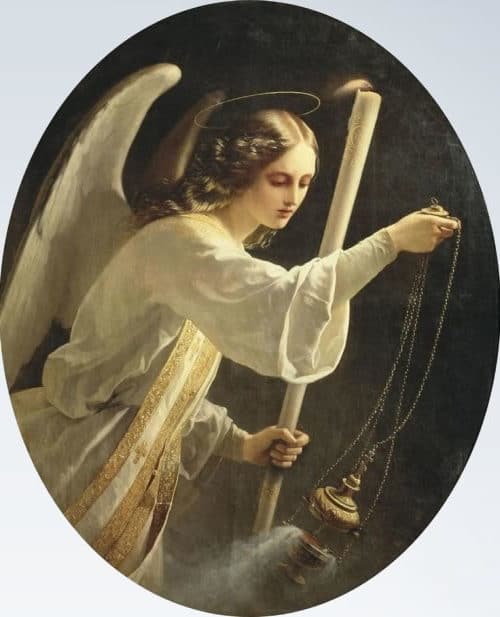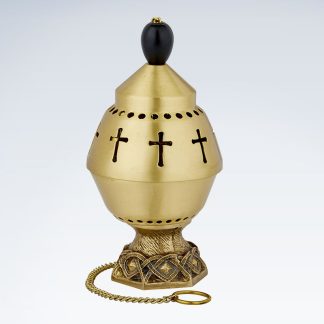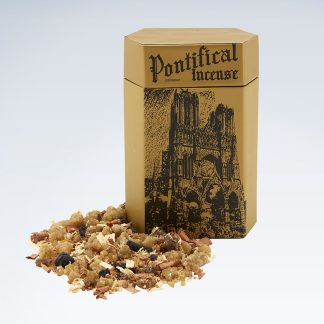

In every Solemn Mass besides the Mass of requiem, and only in the Solemn Mass, the altar is incensed before the Introït. God himself commanded incense (thus or thymiama, from the Greek) to be used in his cult: “Thou shalt make an altar for burning incense… and Aaron shall burn sweet-smelling incense upon it in the morning.” (Exodus 30: 1, 7)
The Magi offered incense to Christ the Lord. By Apostolic institution, the Church of Christ has always used the burning of incense to solemnify her worship of God. (Cardinal Bona and others)
The burning of incense signifies, by the ascent of its fragrant smoke, that all created things should be dedicated to the glory and service of God, and that man’s power and intellectual faculties must be consumed with ardent fervor and zeal for God. Burning incense designates prayer above all else, for prayer ascends as a “good odor” coming from a heart burning with the fire of love. “Let my prayer, O Lord, be directed as incense in thy sight” (Ps. 140: 2).
“An angel stood at the altar, holding a golden censer; and much incense was given him, that he might offer from the prayers of the saints” (Apoc 8: 3)
Cornelius a Lapide writes: “The prayers of the saints are here compared to the burning, not of anything whatsoever, but of fragrant incense,
(1) because prayer rises upward in the manner of incense;
(2) because the prayers of the saints are as delightful to God as the fragrant smell of incense;
(3) because, as incense drives away foul scents, so prayer drives away sin and softens God’s anger;
(4) furthermore, the grains of incense are formed from crushed spices; so prayer ought to proceed from a mortified and humble soul;
(5) and as incense gives forth its smell when it is set ablaze, so prayer becomes fervent in the fire of tribulations” (in Exod. 30: 34) ;
Finally, incense signifies the “good odor of grace” or the mercy of God descending upon us. “Let prayer rise up and the mercy of God ascend.” (St. Augustine)
This symbolism becomes evident when one observes how the smoke of the incense, having washed up the ceiling, spreads out and descends upon the whole church. Arising, it is prayer; descending, it is God’s merciful response. (Gihr)
The Church uses incense primarily to honor God himself, but also to venerate the saints or sacred things or persons. Incense is a sacramental; for it is blessed, even when the Blessed Sacrament is exposed, except for the case in which it is imposed only to incense the Blessed Sacrament itself – for, in such a case, it has the nature of a symbol rather than a sacramental.
At a Solemn High Mass, the incensation takes place at the beginning of the Mass of the Catechumens (before the Introït), and another at the beginning of the Mass of the Faithful (between the offering of the chalice and the Lavabo). It also happens at the principal part of the Mass of the Catechumens (the Gospel) as well as at the principal part of the Mass of the Faithful (the Consecration, at each elevation).
Translator’s Note: Dr Gihr writes: “The cloud of incense is also symbolic of appearance, that is, of the presence of the Lord in the Blessed Sacrament and in His Word; for already in the Old Covenant, the glory of the Lord appeared in the cloud of the Tabernacle (Ex. 40: 32, Lev. 16: 2, Par 5: 13) and on the Great Day of Atonement, the high-priest enveloped the Holy of Holies of the Old Testament with a cloud of incense in token of Jehovah’s relation on that most sacred spot.”
This article comes from “Compendium Sacrae Liturgiae, Juxta Ritum Romanum”, Wapelhorst Innocentius, O.F.M. – The Mass: A Liturgical Commentary by Father Innocent Wapelhorst O.F.M. as translated in an FSSPX Weekly Bulletin.

-
Home Incense Kit with Brass Censer
-
Frankincense and Myrrh Incense€5.75 – €31.87
-
Pontifical Incense€28.98 – €173.86
VIRGÓ SACRÁTA is a Christian mission-driven online resource and shop inspired from the beauty of Catholic faith, tradition, and arts. Our mission is to “Restore All Things to Christ!”, in continuing the legacy of Pope St. Pius X under the patronage of the Blessed Virgin Mary. “Who is she that cometh forth as the morning rising, fair as the moon, bright as the sun, terrible as an army set in battle array?” O Mary, conceived without sin, pray for us who have recourse to Thee.





